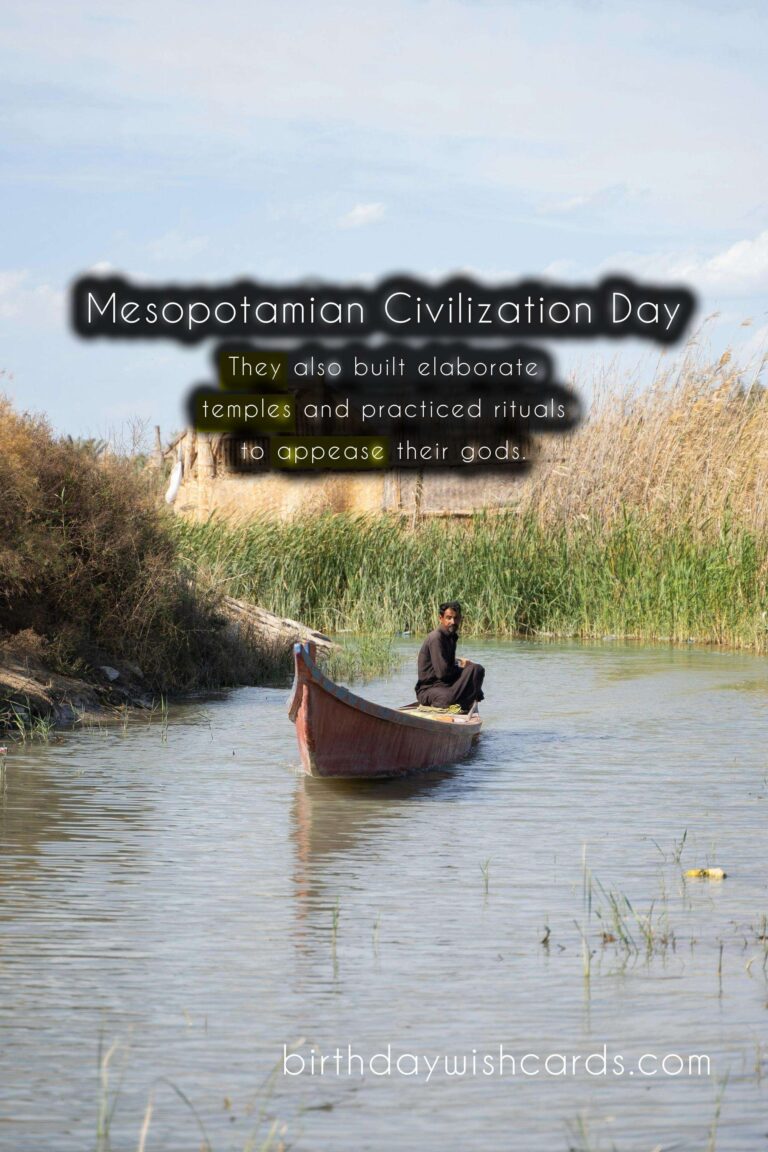
Mesopotamian Civilization Day
Mesopotamia, a historical region in Western Asia, widely known as the cradle of civilization, was the birthplace of many great empires. These early settlements have laid the foundations of modern society as we know it. On April 27, we celebrate Mesopotamian Civilization Day, in honor of the rich and advanced culture that emerged in the region. The Mesopotamian people were the first to pioneer many technological and cultural innovations that have deeply influenced human history. They developed the first system of writing, the cuneiform script, to record their trades and legal proceedings. What set the Mesopotamians apart from others was their ability to form complex and organized civilizations. They built grand, intricate cities with monumental architectures, like the ziggurats, and established a complex society with structured hierarchy. Unfortunately, while the legacy of the ancient Mesopotamians continues to shape the world, many of their feats have been forgotten. This is why we celebrate Mesopotamian Civilization Day – to remember and pay tribute to their accomplishments and influence.
The Mesopotamian Civilization is the oldest known civilization in the world. It is believed that the first Mesopotamian settlements date back to the 6th millennium BC. Life in Mesopotamia revolved around the two great rivers, Tigris and Euphrates. The Mesopotamians developed advanced forms of agriculture, allowing them to have a stable food supply. They also mastered the art of irrigation and built canals to control the rivers for irrigation and transportation purposes. The Mesopotamians were also known for their metalworking skills, creating jewelry, weapons, and tools. The Code of Hammurabi, one of the most significant legal codes in history, was developed by the Mesopotamians. It contained laws and punishments for various offenses and provided guidelines for everyday life. Religion played a crucial role in Mesopotamian society, with various gods and goddesses worshipped, including Marduk, the god of Babylon. They also built elaborate temples and practiced rituals to appease their gods. Mesopotamian trade was extensive, with goods such as textiles, metals, and agricultural products being traded across the region. The region also saw an influx of foreign people, resulting in a diverse cultural exchange. Mesopotamian Civilization Day celebrates the rich and diverse heritage of this ancient civilization. It also serves as a reminder to appreciate the contributions of the Mesopotamians to our society. Through advancements in math, science, and literature, the Mesopotamians laid the foundation for the advancements we see today. We also remember the achievements of the military leaders, such as Sargon of Akkad and Hammurabi of Babylon, who shaped the political landscape of the region. On April 27, let us take the time to explore and learn more about the legacy of the Mesopotamians. We can visit museums, read books, or attend lectures that highlight their achievements and influence. We can also use this day to reflect on how far we have come as a society, thanks to the contributions of the Mesopotamian Civilization. In conclusion, the Mesopotamian Civilization has left a lasting mark on the world and has greatly influenced the way we live today. They may have faded into history, but their legacy continues to thrive and inspire generations.

